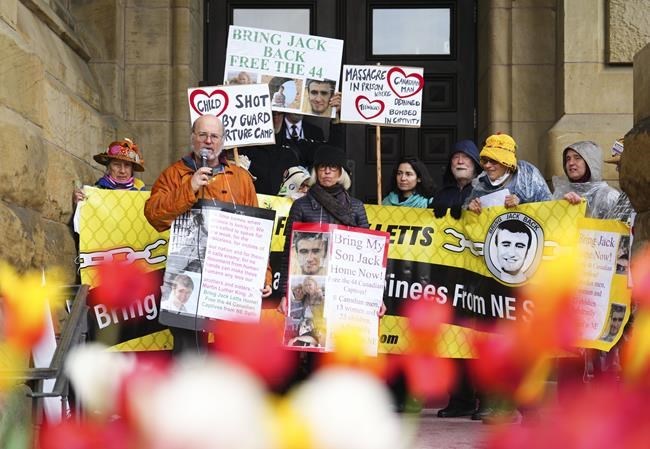OTTAWA — The mother of a Canadian man being held in northeastern Syria accuses the federal government of doing "precisely nothing" to secure his release.
Sally Lane urged the Liberal government Tuesday to send a delegate overseas to help free her son Jack Letts and other Canadians detained in atrocious conditions.
Letts, who turned 27 this week, is one of several Canadian citizens among the many foreign nationals in Syrian camps run by Kurdish forces that reclaimed the war-torn region from the extremist Islamic State of Iraq and the Levant.
Letts was born in Oxford, England, but the British government stripped him of citizenship three years ago.
He became a devoted Muslim, went on holiday to Jordan at 18, then studied in Kuwait before winding up in Syria and, his family says, getting captured by Kurdish forces while fleeing the country with a group of refugees in 2017.
His parents say they have seen no evidence that their son became a terrorist fighter, adding that Letts stood against ISIL and was even put on trial for publicly condemning the group.
"Every night when I go to bed, I have to think of Jack lying on a concrete floor, as he has done for the past five-and-a-half years, going to sleep hungry and in despair," Lane said Tuesday at a news conference in Ottawa.
"I wonder if his kidney stones are giving him excruciating pain, and whether he has managed to persuade the guards to get him medical treatment."
Lane was flanked by supporters including Green Party MP Elizabeth May and Alex Neve, former secretary general of Amnesty International Canada.
Lane said she was told by Global Affairs Canada almost five years ago the government was doing everything it could to obtain her son's freedom.
"Since then, the government has done precisely nothing to secure Jack's release," Lane said. "They have in fact actively prevented and opposed it."
In a June message to Canada, United Nations officials who monitor human rights and arbitrary detention said they had "serious concerns'' about Letts's continuing detention "and his rights to life, security, and physical and mental health'' due to the dire conditions in the camps.
A handful of women and children have returned to Canada from the region in recent years. But Canada has, for the most part, not followed the path of other countries that have successfully repatriated citizens.
The federal government has said Canada's ability to provide consular assistance in Syria is extremely limited given the volatile security situation — a stance that critics have consistently challenged.
"These Canadians must be brought home," Tim McSorley, national co-ordinator of the International Civil Liberties Monitoring Group, said during the news conference. "There are no clear answers as to why the government isn't acting. It's an issue of political will."
Several families have turned to the Federal Court, saying the government's refusal to step in breaches the Charter of Rights and Freedoms.
The federal government says Canada has provided consular assistance to the extent possible, adding there is no legal obligation under the Charter, statute or international law, for Canada to provide such assistance, including the repatriation of its citizens.
In a recent filing with the court, federal lawyers say the duties that the applicants seek to impose "conflict with the principled reasons for taking a restrained approach to the application of the Charter outside of Canada."
A public Federal Court hearing is slated for early next month.
Last month, Oumaima Chouay and her two children, as well as another Canadian woman, Kimberly Polman, returned from Syria.
Chouay faces several charges, including leaving Canada to participate in the activity of a terrorist group. Polman has been granted bail pending a peace bond hearing.
Lane said these recent returns have shown it is "not too difficult or too impossible, as the government falsely claimed before."
This report by The Canadian Press was first published Nov. 15, 2022.
Jim Bronskill, The Canadian Press




